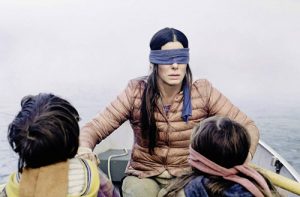provocations
They will tell you that you’re not a real writer. They say that having another job you do for money makes you soft. Don’t you believe in yourself enough to suffer, to struggle, they ask? They pretend it’s a question, but to them, it’s not a question; they only accept one answer. If you care enough, you’ll dedicate yourself to The Art, they say, and anything less than that stark, all-in commitment marks you as a creative failure. If you get hungry enough–literally hungry, they say–then The Art you make will be superior and success will flow to you like water and all manner of things shall be well.
When they say this, they are wrong.
There are writers who rely solely on their writing, fiction or nonfiction, for income. There are writers with full-time jobs that have nothing to do with writing, and these writers fit in their creative pursuits early in the morning, late at night, on vacation days, whenever. There are stay-at-home parents whose primary work, unpaid though it may be, can be all-consuming, and they, too, write in the stolen moments, during naps, or after bedtime, or when one kid can be convinced to read a book to the other one, or on the bleachers at a soccer game. (Hockey game. Lacrosse game. Swim meet. Ballet lesson. You get the idea.)
They are all writers. If you write, you are a writer. That’s pretty much how the definition works.
And you are a working writer.
The type of work you do, writing-related or otherwise, does not make you more or less legitimate. Starving does not make you better. Or maybe it does–maybe you have thrown caution to the wind and dedicated yourself to full-time writing without a back-up plan and maybe the writing you’re producing now is pure gold, sheer magic, the best you’ve ever written–but if that isn’t the situation you find yourself in, don’t you dare think of yourself as less than. Don’t let anyone tell you that’s the only way to do things.
There are an infinite number of ways to do things. (And because you’re a writer, you can probably imagine somewhere between 15 and 83 of them off the top of your head. Good job, writer!)
Look, the internet is both the cause of and solution to all life’s problems, but don’t believe anyone on the internet who tells you what it takes to be a real writer. Yes, I acknowledge this is a ridiculous thing to say in an essay on the internet about what it means to be a particular type of writer. But note that I would never use the word “real” in this context. We’re writers, after all, aren’t we? Every word counts.
Read MoreThis fall, I started a job teaching 7th grade English. It began as a part-time job, just .5. Then, three weeks ago, the other 7th grade English teacher resigned, and since then, I find myself teaching his classes as well as mine … meaning that I am 1.2 time. Meaning that now I really have zero time to write.
But while I miss writing terribly, I love my students so much, partly because seventh graders are so easily grossed out. For example, if I want them to move their desks together into little pods, I say, “Please make your desks kiss!” They find that so gross. Which makes me laugh. Which means I laugh a lot more than I ever did as a .5 teacher. I love laughing while working.
What does not make me laugh at work? What does not bring me joy? Teaching poetry.
Reading poetry fills me with dread. Talking about poetry multiples the dread. Presenting my students with poems that I don’t understand? That’s dread to the power of infinity.
So, three weeks ago, on the first day of the Poetry unit, I decided to be honest with my students.
“I have a confession,” I said.
The kids grew instantly silent and perfectly still.
“Please don’t tell anyone,” I continued, “because English teachers can get fired for something like this. But here’s the truth: I don’t love poetry.” I cringed. “Some poems, in fact, I find really, really … boring.”
A few kids nodded.
“So I promise,” I continued, “we will only study poems that, at least in my opinion, aren’t boring.” I held up three, glued-together fingers as if making a teacher oath (which may have in fact been the Girl Scout Promise). “We will only study poems that change the way we see the world.”
I wasn’t sure where this past part came from. Did poems change the world? And if so, how? And why? And where were these particular poems?
To be clear, there were a few poems I did like. Ones by Wislawa Szymborska, Billy Collins, and William Carlos Williams. Adrienne Su, Adrian Matejka, Nikki Giovanni. But I didn’t care for the canon of poetry, the ones I read when I was in school, the ones I taught in previous teaching jobs. Those poems never ignited me. Poetry was a chore. Poems were so darn serious! Plus, I could never remember the differences between trochaic, pyrrhic, and spondee feet.
But then I learned about talking subway seats.
Read MorePlease welcome Harper Glenn to Writer Unboxed today! Harper’s with us to share the story behind a work-in-progress, and an illuminating moment that changed everything.
Harper was born and raised in Georgia. She’s a lover of vintage brown paper, old cast iron flat irons, cracked mirrors, white sage, old cemeteries and writing dark #OWN narratives. She’s represented by Katie Shea Boutillier with The Donald Maass Literary Agency.
Learn more about Harper by visiting her website, and by following her on Twitter and Instagram.
Are You Tethered to the Wrong Story?
“Nothing ever goes away until it’s taught us everything we need to know.” It’s a cliché quote, quoted different ways, by many wise people. Nevertheless, it’s true—true in life, true while writing. But let’s jump out of the intro. And I’ll explain how holding onto the wrong WIP taught me to write the right one.
Autumn 2014, I was sitting outside a cafe somewhere in North Carolina, staring at a ginger-haired man rocking a larger than life beard. My imagination whirled. And later that night, my creative genius sat pensive behind my fingers and typed. We created a fictional character: a red-headed woman named Prue, who stalked and killed men with beards. Much like the fictional character Dexter, Prue had murder guidelines. Every man she killed must have red hair, a beard, and documented criminal cases. Prue was a librarian passionate about books, who secretly wrote a novel about her killings. Prue was my hero, a vigilante, protecting lives one cremation at a time.
“This is THE BOOK,” I’d thought. “It’s marketable. Prue’s gonna get me an agent.” She HAD to.
Because– Well, let’s go back.
Spring 2012, after completing my first manuscript, I queried over 65 agents, received over 40 rejections, garnered 10 partial requests, 3 full requests, and one R & R, but had no offers of representation. Attended my 1st writers conference: The Dallas-Fort Worth Writers Conference in Texas.
Between Fall 2012 – Spring 2014: I completed 1 NANOWRIMO, wrote 5 screenplays, and 2 manuscripts. I had 9 uncompleted manuscripts (word count ranging from 4k-25k). I queried over 50 agents, and had 12 partial requests but no one wanted the full; there were no offers of representation. I attended The New York Pitch Conference in NY. I got a few bites at the conference, but I chickened-out and didn’t send the manuscript.
Summer 2015, my wife and I separated. I stopped planning. Stopped writing. And after a year of depression, procrastination, no planning, no writing…I woke up. And wrote again.
Only things were different now. I was different; so was Prue. After my divorce, Prue became ruthless. She didn’t know why she was killing anymore—knocking-off men with black beards, brunette goatees, and yellow mustaches for no reason. And she didn’t care. Prue was a mess; I was a mess. We were two fast trains on opposite ends of the same track, and reality. We crashed. After the collision, my creative genius got into bed, hid its face, cried, fell asleep. I crawled into bed behind it, hid my face, cried, fell asleep.
Fall 2016, I woke up. I’d had a dream. In the dream, a young girl walked toward a forbidden bridge where a […]
Read MoreImage – iStockphoto: Last 19
Listening Up
For me, it’s always a kind of relief to write a piece for Writer Unboxed. That’s because you, Unboxed one, are among the most consistent elements of publishing.
Writers tend to work through the upheavals of the industry by focusing ever more intently on writing. This actually is not the pathway taken by many others in the industry.
As economic and market forces bash and bang up the business, company people (rightly) believe they have a mandate not only to adapt but to innovate, to look for things that will accommodate and/or ameliorate the changing circumstances of a creative industry in profoundly changing times. The industry! The industry!
And so my reporting at Publishing Perspectives and at The Hot Sheet have a lot to do with change: lots of trial and lots more error, fits and startups, big trends that fizzle in under two years, minor fads that flatten everybody’s expectations, and the abiding difficulty that this industry has in understanding itself as part of a major entertainment complex that has overtaken it.
On that last point, it’s not everyone. I love the exceptions: some of publishing’s brightest leaders are working well to associate themselves with studios and other production players to reposition bookish content for survival in a screened landscape.
But another thing I value in the Writer Unboxed community is the authorial viewpoint that, of course, isn’t always factored into industry thinking.
And today, I’d like to “provoke you,” to use a pleasantly over-strong term, to give me your input on an important distinction that I fear some in the business may be overlooking, and that I’ll bet many in the author corps are not.
Let’s say that there’s a difference in the content and the act: the story and the reception of it.
Heres what I’m on about. As you know, publishing’s shooting star at the moment is audiobooks. Oh, those double-digit gains. The Association of American Publishers just reported that between January and August of this year, downloaded audio was up 37.5 percent over the same period last year, by far the biggest gain in all publishing. And this is being replicated in other world markets we cover.
Audio is hot, hot, hot. (As long as it’s downloaded. Physical audio in the same time-period comparison tanked by 24.6 percent. We don’t need no stinkin’ CDs or cassette tapes, thanks just the same.)
So big is audio that at The FutureBook conference in London in November, my former associates at The Bookseller will be staging a full day of audiobook sessions–there’s an entire audio conference running parallel to the main stream. (And we could have bought stock in headphone makers, you know.)
As I’m sure I’ve bored you by saying before here, my own pet pleasure in this thing about audio is that in some markets like the UK (but not yet in Canada, we just learned), guys are leading the way in audiobook sales. Yes, guys. Outbuying the women in books. Sounds like another planet, doesn’t it? But it’s true. As long as it’s audio, the guys are in the […]
Read Moreimage by Sheng P.
My novel The Kitchen Daughter was published in 2011. Seven years is not that long ago, really, but for many reasons, it feels like a different lifetime. The world has changed a great deal in less than a decade, and publishing has changed along with it—in ways both negative and positive.
When I made the decision to write a novel from the perspective of a character on the autism spectrum, such books were relatively rare on bookstore shelves. Basically, if people had read a book with an autistic narrator, it was almost certainly Mark Haddon’s The Curious Incident of the Dog in the Night-Time. (Which of course, in certain circles, gave rise to the typical publishing conversation of “Isn’t your book kind of like a book that already exists?” And the standard, exasperated answer, “Yes, except not at all.”)
In the beginning, my decision to write from an autistic character’s perspective originated from a logical place, not an emotional one. I love to cook, and when I prepare meals, I’m doing it to connect with people. I wanted to write about someone who cooks without any intention of connecting—someone isolated partly by circumstances and partly by choice—but who comes to realize that she can use cooking to connect.
When I began writing the book, I had recently met the writer John Elder Robison, whose memoir Look Me in the Eye brought what was then called Asperger’s Syndrome to the attention of many. After delving into everything I could find written on the topic, including first-person accounts written by women on the spectrum, I made the decision that the narrator I wanted to write had undiagnosed Asperger’s, and the story unfolded from there. I dug in, learned everything I could, worked to define Ginny’s unique experience, enlisted a host of readers who could tell me what didn’t ring true, and wrote and rewrote until the book was the best I could make it.
If I were facing this decision in 2018 instead of 2008, would I have made the same choice? I’m not at all sure.
Read Moreimage by Anthony Auston
It is a truth universally acknowledged that a writer whose latest post is scheduled to publish on Labor Day must, when considering topics, find herself muttering, “Well, shouldn’t I write something about work?”
And so, because there are many, many things to say about the work of writing, I put together a long list of short thoughts on the topic.
Creative adjacencies impact a writer’s work itself. Choosing what to read or watch–how much are you looking for stories that lie adjacent to your own material?
Read MoreTalking with a group of aspiring writers recently, I was struck by how many of them felt like everyone in the publishing world was against them. “Why are agents so narrow-minded about what they want?” one asked. The frustration was nothing new — anyone who’s spent time talking to writers in person or on the internet knows frustration is the meat we feed on — but I was particularly uncomfortable with how much of the frustration was directed against individual people, rather than a system that can’t give all of us what we want all of the time.
So I thought I’d do a handy list of who and who isn’t your enemy in the publishing world. (Keeping a list of enemies isn’t something I generally recommend, for all sorts of reasons, but I think you’ll see how this one can be useful.)
OK, you’re asking, so if none of those people are arrayed against me, why am I so miserable? What’s keeping me down? Indeed, I have some thoughts on that front as well.
Read MoreLos Angeles from the Griffith Observatory. Image – iStockphoto: Trek and Shoot
Is Your Film Treatment Ready?
In the run-up to Writer’s Digest’s Annual Conference at the Manhattan Hilton in New York (August 10-12), it’s been interesting to note the presence of some screenwriting sessions on the schedule. On the Thursday pre-show day of standalone events, for example, there’s a daylong seminar on “Screenwriting for Newbies and Novelists” with Jacob Krueger–who runs a studio series of training programs year-’round.
And on the Saturday of the conference, Jeanne Bowerman, longtime editor of Script Magazine (and a vivacious personality whose energy may be running half of Los Angeles’ power grid), is giving a session called “Introduction to Screenwriting,” one of the types of sessions she has frequently offered in California iterations of Writers Digest’s conferences.
While elements of screenwriting programming aren’t entirely new to writers’ conferences, they tend to stand out a bit more in “the age of Netflix.” A new emphasis on storytelling in fine television work and cinema has been part of many discussions recently, something I touched on in April here at Writer Unboxed.
One of the most compelling exercises arrived about 10 days ago, when the Publishers Association–the UK counterpart to the Association of American Publishers in the States–released a major study (PDF) it had commissioned, the big message being that film, TV, and stage productions likely to do best on the market are the ones that start with a book.
As we’ve reported at Publishing Perspectives, when compared to original scripts and screenplays, the Publishers Association is announcing that book adaptations attract, on average:
A point of interest to those following the Brexit saga in the UK: the Publishers Association’s report is both clever and important to the British publishing industry, which is working very hard this year to display its importance among the “creative industries” (entertainment) in the country’s economy as the break with Europe approaches. Those industries are going to need robust support in the development of trade treaties for export and other arrangements that for decades have been covered by European Union rules.
So the impetus for the association is a wise one, but it also gives us a chance to look at a rarely quantified view of the industry.
Whether you subscribe to the idea that the “storytelling imprimatur” may be shifting somewhat from books to screen (meaning not as many film and TV works are based on them), we’re clearly in a “golden age,” as some are calling it, with film and television gaining traction in the attention economy. Production is booming at Amazon Studios, HBO, Hulu, Showtime, and the ubiquitous Netflix, which now originates many of its finest shows in non-English markets first before bringing them into the US system.
I can recommend, for example, the system’s first French-produced outing, Dan Franck’s political thriller Read More
All characters have desires. Desire is the engine that drives your story, it’s what gives the hero a goal—find the killer, fall in love, destroy the death star.
If your characters get what they want on page one, there’s no story left. It’s your job, as an author, to give your characters what they want at exactly the right time. Or not at all.
Until then, you have to play with that desire, use it to develop the drama that will push the story along and pull your readers with it.
There are a few straightforward ways to use your characters’ desires to inject drama into your story, to fuel that engine that will keep your readers engaged.
These techniques are useful for when you’re stuck, when you’re not quite sure what’s going to happen next. They can also help to get back control of your characters when they run off and do their own thing, when they stray away from your carefully plotted plan.
Hold back
The most obvious way is to keep your character wanting.
As I said, the story (usually) ends when your characters get what they want. Keep that goal just out of reach until you’re ready, until it’s time to give your characters—and the readers—what they want.
Too much, too little, too late
Sometimes you can give your characters what they want and still keep the story going.
If you give them too much of what they want, that will also create conflict. You can even give them too much right at the start and use that as a story premise. Reality shows like The Bachelor use this to drive a full season. He wants a bride and now he has to choose from 25 potential partners.
Giving too much can even be like giving someone dying of thirst a whole bottle of water: if they drink it all in one go, they’ll be sick. Your characters will have to be careful when they get more than they need. Will they have the kind of self control necessary to handle it?
Similarly, if you give your characters just a taste of what they really want, that can lift their desires even higher and increase their motivation to get more.
Money is the obvious example here, but you can use time too. Give them enough to get within reach of their goals, but not quite enough. They will then desperately need that last little bit.
And then there’s when your characters get exactly what they want, but it’s too late. They don’t need it any more.
This works especially well with smaller desires throughout the plot, in scenes or in individual chapters. They find the combination for the bank vault, but they’ve already blown the doors off and now the cops are on their way.
This can be useful to reveal the characters’ frustrations and emphasize how great their desires are, and it can be used to add to humor too, to lighten the mood a little.
And now for something different
Read More



















